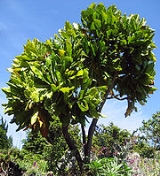
Meryta denhamii
Encyclopedia
Meryta denhamii is an evergreen
tree
endemic to New Caledonia
, where it occurs in dense humid forest.
(?-1866), a gardener at the Edinburgh Botanic Garden, who joined the HMS Herald expedition to the south-western Pacific (1852-1856) as a botanist. Milne found the tree growing on the Isle of Pines
in the south of New Caledonia. Specimens were sent to the Royal Botanical Gardens in Kew where the plant flowered in the greenhouse in 1860. Two years later botanist Berthold Seeman named the plant Meryta denhamii in honour of Henry Mangles Denham
, Captain of the Herald, for whom also the town of Denham, Western Australia
was named.
, which has wider leaves and can withstand frosts down to -2C once established.
Evergreen
In botany, an evergreen plant is a plant that has leaves in all seasons. This contrasts with deciduous plants, which completely lose their foliage during the winter or dry season.There are many different kinds of evergreen plants, both trees and shrubs...
tree
Tree
A tree is a perennial woody plant. It is most often defined as a woody plant that has many secondary branches supported clear of the ground on a single main stem or trunk with clear apical dominance. A minimum height specification at maturity is cited by some authors, varying from 3 m to...
endemic to New Caledonia
New Caledonia
New Caledonia is a special collectivity of France located in the southwest Pacific Ocean, east of Australia and about from Metropolitan France. The archipelago, part of the Melanesia subregion, includes the main island of Grande Terre, the Loyalty Islands, the Belep archipelago, the Isle of...
, where it occurs in dense humid forest.
Description
M. denhamii grows to about 6m tall. The large, stiff, leathery leaves are elongated, curved at the edges and appear in tufts or bunches at the ends of the branches. Their central rib is thick and fleshy with longitudinal grooves. On younger trees the leaves are up to 45 cm long and about 12 cm wide. On older trees the leaves may be up to 1 metre long and 24 cm wide. The flowers exude a sweet scent. The plants are either female or male. Since the anthers protrude from the flowers, it is likely that the pollen is spread mainly by wind. Female flowers also occasionally produce anthers, but these are stunted and unproductive.Discovery
M. denhamii owes its discovery to Scots William Grant MilneWilliam Grant Milne
William Grant Milne , was a Scottish botanist.A gardener at the Edinburgh Botanic Garden, Milne joined the HMS Herald expedition to the southwestern Pacific as a botanist. The expedition visited, inter alia, Lord Howe Island, New South Wales and Western Australia...
(?-1866), a gardener at the Edinburgh Botanic Garden, who joined the HMS Herald expedition to the south-western Pacific (1852-1856) as a botanist. Milne found the tree growing on the Isle of Pines
Isle of Pines, New Caledonia
The Isle of Pines is an island located in the Pacific Ocean, in the archipelago of New Caledonia, an overseas territory of France. The island is part of the commune of L'Île-des-Pins, in the South Province of New Caledonia. The Isle of Pines is nicknamed l'île la plus proche du paradis...
in the south of New Caledonia. Specimens were sent to the Royal Botanical Gardens in Kew where the plant flowered in the greenhouse in 1860. Two years later botanist Berthold Seeman named the plant Meryta denhamii in honour of Henry Mangles Denham
Henry Mangles Denham
Vice Admiral Sir Henry Mangles Denham, CMG was a Royal Navy officer who went on to be Commander-in-Chief, Pacific Station.-Early career:...
, Captain of the Herald, for whom also the town of Denham, Western Australia
Denham, Western Australia
Denham is the administrative town for the Shire of Shark Bay, Western Australia. At the 2006 census, Denham had a population of 607.Located on the western coast of the Peron Peninsula north of Perth, Denham is the westernmost town in Australia, and is named in honour of Captain Henry Mangles...
was named.
Cultivation
Rare in cultivation, M. denhamii may be grown fairly easily in warm frost-free climates like those of Sydney, Australia, or Florida in the United States. A slightly hardier alternative is the New Zealand Puka tree, M. sinclairiiPuka (tree)
Puka or Pukanui is a large-leaved evergreen tree endemic to New Zealand that grows to about 8 m tall, with the distinctly tropical appearance typical of the genus. There are about 27 species of Meryta, all small, resinous trees of the subtropical and tropical Pacific Ocean.Puka occurs naturally...
, which has wider leaves and can withstand frosts down to -2C once established.

